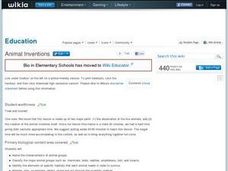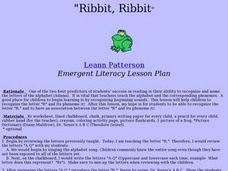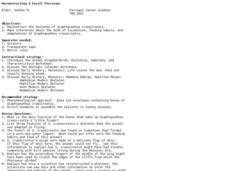Pennsylvania Department of Education
Animal Classes and Their Ecosystems
Students explore animal characteristics by participating in an environment identification activity. In this animal habitat instructional activity, students discuss a range of different wild life and the ecosystems that they are a part...
Curated OER
Animal Inventions
Students name the characteristics of animal groups. Students classify the major animal groups such as: mammals, birds, reptiles, amphibians, fish, and insects. They identify the elements of specific habitats that each animal needs in...
Curated OER
Animal Classification
Second graders identify characteristics of and group animals by the five categories of vertebrates.
Curated OER
Animal Alphabet
Second graders identify animals with each letter of the alphabet. In groups, they create a PowerPoint presentation which shows the information they have collected about each one. Using all of this information, they create an animal...
Curated OER
Heating and Cooling a Really Large Lizard
Remind your middle school scientists how fox ear size varies depending on the climate they live in; large ears allow heat loss while small ears keep heat in. Discuss how a cold-blooded animal might try to regulate body temperature. Then...
Curated OER
The Animal Kingdom of Vertebrates
Seventh graders classify fish according to their characteristics. In this classification lesson students learn how to group animals including birds, reptiles and amphibians.
Curated OER
Amphibians-Frog Dissection
Students compare the anatomy of a fish to an amphibian and that of an amphibian (frog) to a human. They complete a virtual frog dissection to gain some experience prior to the real dissection.
Curated OER
Biology In Elementary Schools
Learners classify animals into six major animal groups and describe the characteristics of the animals found within each group. In this living and non-living animals lesson, students observe a variety of animals, both living and...
Curated OER
Hatching chickens
Students recognize the need for gentle care of eggs. In this chicken hatching lesson, students observe the process of incubating eggs for hatching. Students find the materials needed to properly care for the chicks. Students complete a...
Curated OER
Ribbit! Ribbit!
Students research a frog's life cycle and habitat using books, the Internet and lecture. Students make origami frogs, write letters to Toad from Arnold Lobel's "Frog and Toad" and participate in a simulated camouflage activity.
Curated OER
Reconstructing a Fossil Pterosaur
Learners reconstruct the skeleton of the fossil Scaphognathus crassirostis. In this fossil lesson plan, students discuss the Kingdoms of life, geologic history and the history of the skeletons of species. Learners are given 20 minutes to...
Curated OER
Marine & Aquatic Habitats Activities - Habitats of Birds, Fish, and Mammals on the Island and the Pacific Region
Young scholars create habitats in jars to understand integral aspects of plants' and animals' habitats.
Curated OER
Migration Woes
Students are able to describe the reproductive cycle of the gopher frog. They are able to describe the impacts of habitat loss and degradtion on gopher frog populations. Students are explained that many factors limit the survival of...
Curated OER
Loss of Wetlands: Subsidence
Students observe subsidence and the effect it has on wetlands with a classroom demonstration. They think about the impact of global warming and the sea level and how it affects the marsh.













